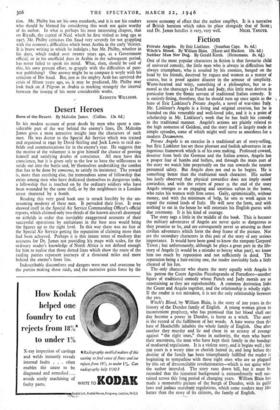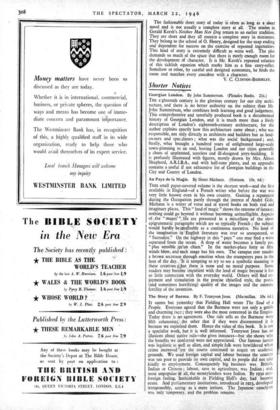Fiction
ONE of the most popular characters in fiction is that favourite child of universal comedy, the little man who is always in difficulties but always triumphant, who is assailed by his enemies, banged on the head by his friends, deceived by rogues and women as a matter of course, but is proof against disaster in the armour of simplicity. Warm-hearted and witty, something of a philosopher, but as a- moral as the charactgs in Punch and Judy, this little man derives in particular from the fomic servant of traditional Italian comedy. It is entirely fitting, therefore, that he should turn up once again as the hero of Eric Linklater's Private Angelo, a novel of war-time Italy. Mr. Linklater's Angelo is a living and original creation, but he is founded on this venerable and well-loved joke, and it is a point of scholarship in Mr. Linklater's work that he fias built his comedy in the traditional manner. - Angelo's actions are plainly related to the high nonsense of Goldoni, and the story itself is largely made in simple episodes, some of which might well serve as anecdotes for a modern Decameron.
Private Angelo is an exercise in a traditional art of story-telling, but Eric Linklater has set these pleasant and foolish adventures in an ingenious framework which is of his own making. Professed coward, deserter from both 'the German and the Italian armies, Angelo has a proper fear of bombs and bullets, and through the main part of the story we watch him perpetually on the run towards the nearest presumed safety. But Angelo does not end as he begins. He is something better than the traditional stock character. His author has justly observed that physical cowardice does not imply moral cowardice, and. with the return of peace at the end of the story Angelo emerges as an engaging and uxorious sultan in the home, who rules his women with firm sense. Gaily, optimistically, without money, and with the minimum of help, he sets to work again to repair the ruined lands of Italy. He will save the farm, and with nothing to eat in the house he will entertain his English guests with due ceremony. It is his kind of courage.
The story sags a little in the 'middle of the book. This is because the military adventures of Angelo are never quite as dangerous as they promise to be, and are consequently never so amusing as those civilian adventures.ivhich form the deep frame of the picture. Nor are the secondary characters in this part of the story of any serious importance. It would have been good to know the rampant Corporal Trivet ; but unfortunately, although he plays a great part in the life- story of Angelo (it would be a mistake to betray what part), we know him too much by reputation and not sufficiently in deed. The reputation being a hair-raising one, the reader inevitably feels a little cheated of his fun.
The only character who shares the story equally with Angelo is his patron the Count Agesilas Piccologrando of Pontefiore—another figure of traditional comedy whose Punch and Judy morals are as entertaining as they are reprehensible. A common derivation links the Count and Angelo together, and the relationship is wholly right. If the reader is not mistaken, it is not the only relationship between the two.
Witch's Blood, by William Blain, is the story of 200 years in the history of the Dundee family of English. A young woman given to inconvenient prophecy, who has promised that her blood shall one day become a power in Dundee, is burnt as a witch. The story is the record of the fulfilment of her words. A hate worse than the hate of Heathcliffe inhabits the whole family of English. One after another they murder and lie and cheat in an ecstasy of revenge against " the right ones," those in authority, the men who burnt their ancestress, the men who have kept their family in the bondage of mediaeval regulations. It is a violent story, and it begins well ; but 200 years is a weary time to cherish hatred in, and long before the destiny of the family has been triumphantly fulfilled the reader is beginning to sympathise with those right ones who are so plagued by this set of irreconcilable revolutionaries—which is not quite what the author intended. The story runs down hill, but it must be recorded that the Historical background is extraordinarily well sus- tained across this ldng period of changing years. William Blain has made a memorable picture of the burgh of Dundee, with its guild laws and jealous merchant regulations, which some readers may like better than the story of its citizens, the family. of English. The fashionable short story of today is often as long as a short novel and is not usually a complete story at all. The stories in Gerald Kersh's Neither Man Nor Dog return to an earlier tradition. They are short and they all contain a complete story in miniature, They belong to the school of 0. Henry, designed for the snap ending and dependent for success on the exercise of repeated ingenuities. This kind of story is extremely difficult to write well. The plot demands so much of the space that there is rarely enough room for the development of character. It is Mr. Kersh's repeated solution of this ticklish equation which marks him as a fine story-teller. Somehow or other, by careful and designed economies, he finds the room and matches every anecdote with a character.
V. C. CLINTON-BADDELEY.































 Previous page
Previous page